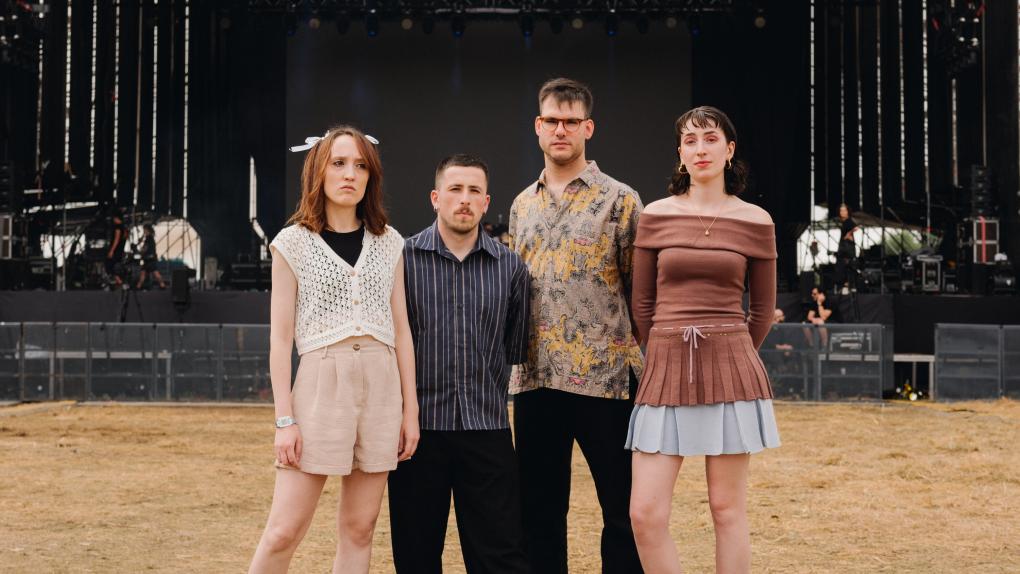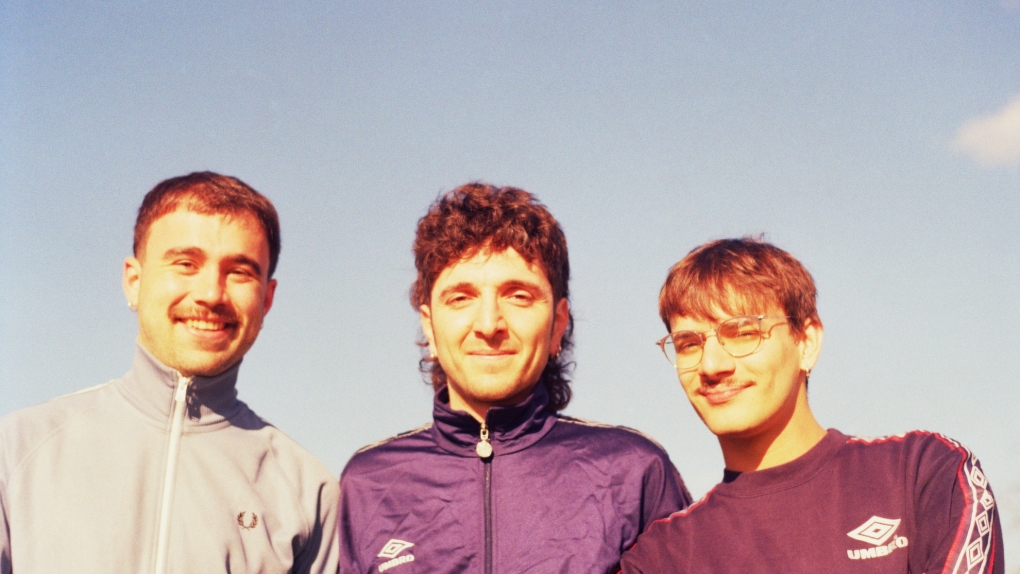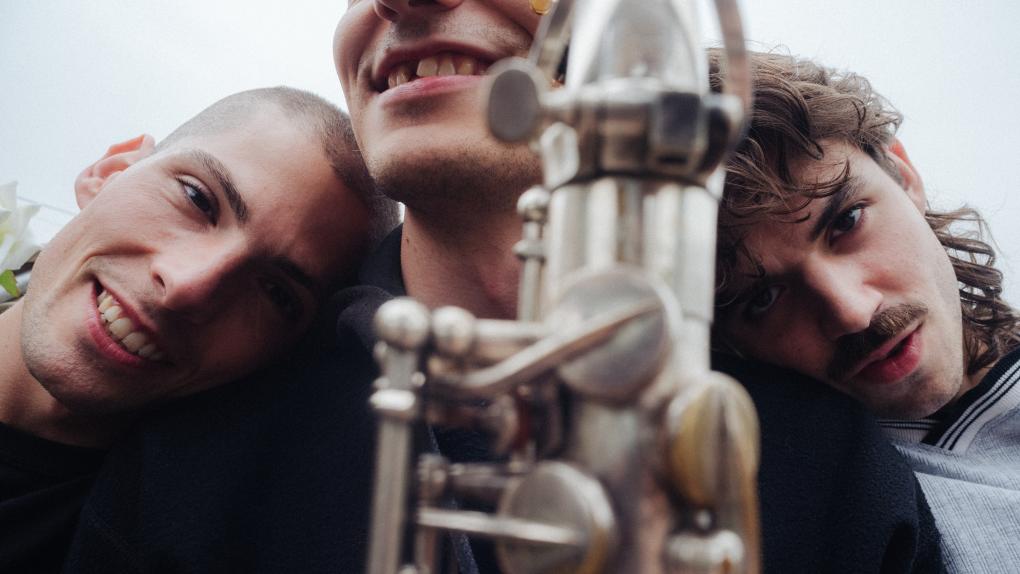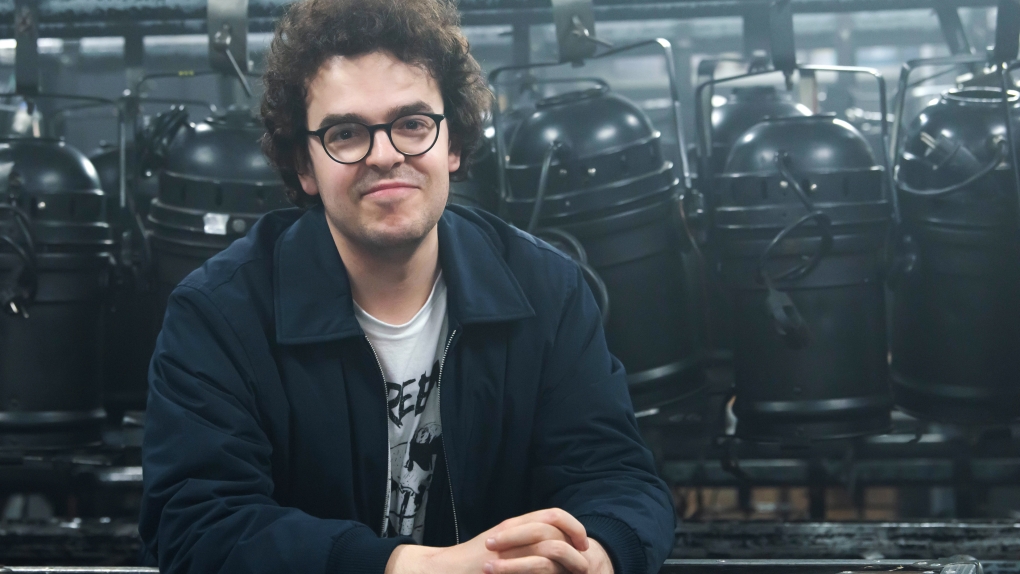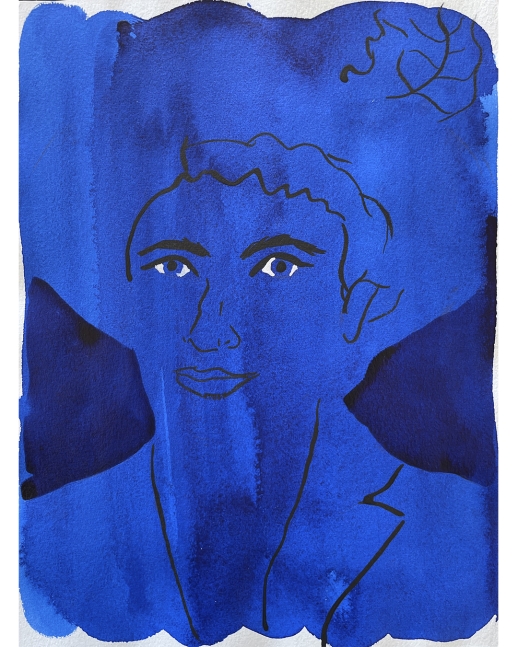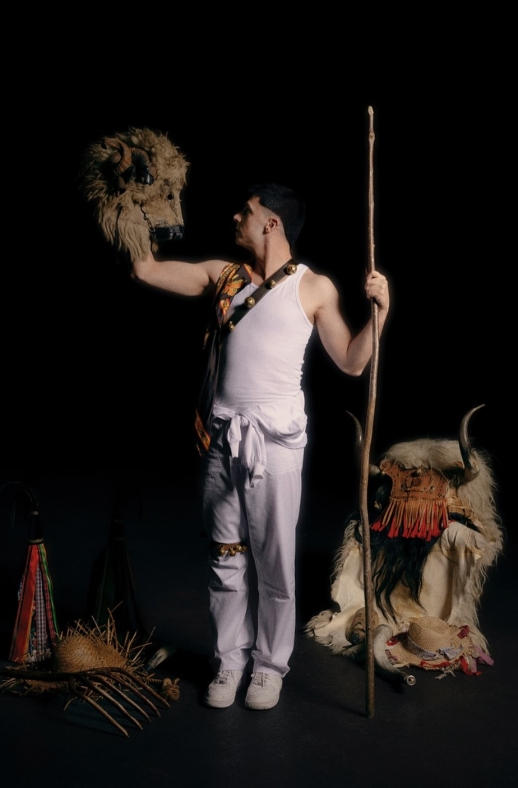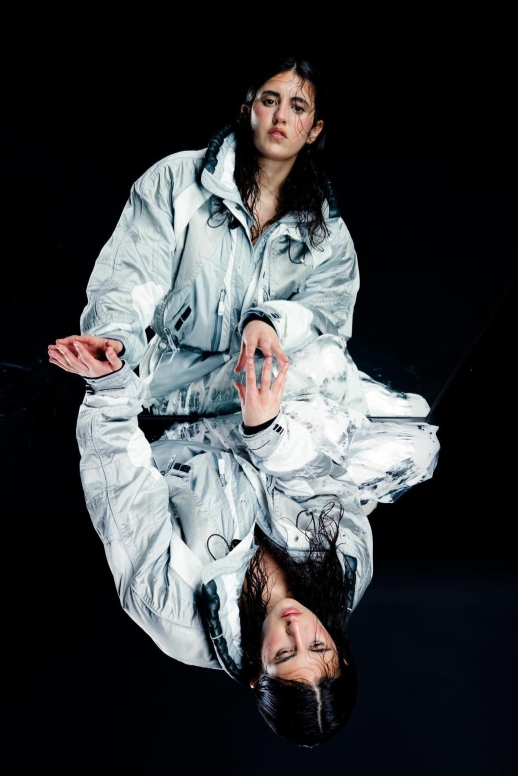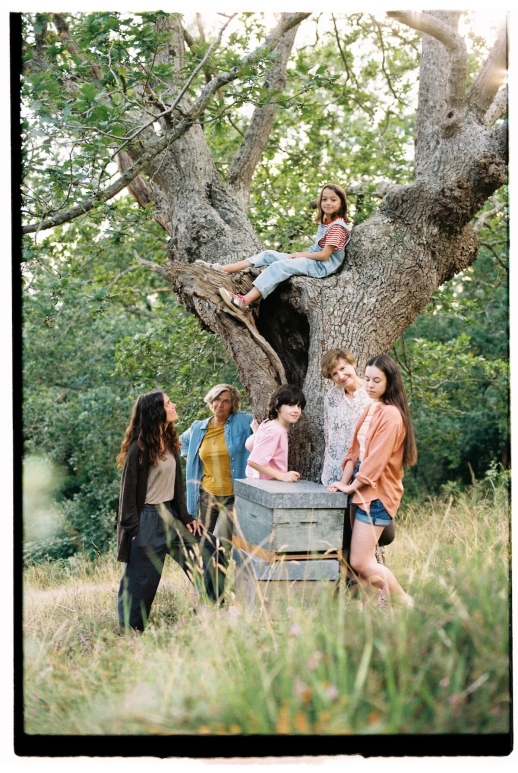Singing primarily in Basque, with two main focal points: Bilbao and Pamplona. A number of exciting bands have revitalised the country´s stages with their guitar-driven sounds.
The guitars are back! An X-ray of the new Basque indie scene
06 Jun 2025It’s a little more than 24 hours before Tatxers start their mini Andalusian tour in Granada and they have some bad news: the car they’re travelling has broken down in the province of Soria, one of the epicentres of what is referred to as ‘empty Spain’. The group from Pamplona, made up of three twenty-somethings who, five years ago, set off down a path that has turned the Basque music scene on its head, take it with a sense of humour. When I ask them how the trip is going, Jon Salinas (bass, vocals) downplays the incident in a WhatsApp message: ‘Our car broke down on the way here and we´re at a garage in Soria, hahaha!’ Once the problem is solved, they hit the road again, heading to the southern end of the peninsula.
A hectic weekend awaits them there. The following day, Friday 28th March, they’re playing at the Sala Víbora in Granada, home of the Alhambra, free tapas and Federico García Lorca, together with Lukiek, a group from Mungia, Bizkaia, that champions the loud, guitar-driven music of the ´90s. On Saturday 29th the same line-up will join Borla, another promising pop band from Pamplona, in a small festival organised in Sevilla by the local musical project Andalucian Über Alles. Over the course of two nights, a few hundred fans will gather in the audience, but behind these numbers lies an intriguing story: three of the four bands participating in the event hail from the Basque Country, sing in Basque, and play electric guitars.

Pamplona and Bilbao are the nerve centres of an emerging independent music movement that goes beyond the usual circuits of self-managed social centres (gaztetxes) and clubs, making its way to larger festivals and events. In addition to the names already mentioned, EZEZEZ, Sal del Coche, Txopet, Pinpilinpussies, Hiuzz and Airu, among others, make up a new generation of young Basque musicians born in the 1990s, straddling the line between Generation Z and millennials—rediscovering the distorted and melodic sounds of previous decades while also incorporating contemporary influences. Like all grassroots movements, it is vibrant, genuine, and irresistibly appealing. What is stirring in the Basque catacombs is not so far removed from the post-punk whirlwind unleashed by bands such as Fontaines D.C., Idles, Shame, Viagra Boys or Alcalá Norte in different parts of Europe.

Pamplona, shaking up the underground
All roads in the new Basque indie scene lead to Pamplona. The city´s musical underground has been shaken by the raw energy of guitar music in Basque. The first to rediscover some of the universal laws of power pop (edginess, vocal harmonies, exquisite melodies) were Tatxers. Time and again, it has been noted how closely they resemble iconic Basque bands from the ´80s (such as Zarama, Hertzainak, and Itoiz), as well as those etched in the British collective memory, like The Jam and The Buzzcocks. They create music that may seem simple at first, but it´s fast-paced and features bass, guitar, and drums that can drive any music fan wild.
Tatxers’ breakthrough came in 2021 with a fist-in-the-air anthem that is more than just a song: ‘Goizean Oskorri’. The single, from the EP ‘Hiruzpalau amets larri’, definitely put the group on the map, with bittersweet lyrics about finding an open door on the run. Tatxers are the revelation band. Timéo Dedieu, the drummer of Borla, who recently reissued their debut LP, ‘Kordoba bidea,’ cites them as a model: “They’ve successfully connected with younger audiences, particularly 17- and 18-year-olds, who emulate what they hear. This has introduced a more pop vibe, whereas traditionally, the focus here has leaned towards punk rock,” he explains.
Martin Ziriza (vocals, bass), who is also part of Tatxers, includes the all-female group Melenas, from an earlier generation, in a constellation of friendly bands that share a similar musical vision: “I think we all feed off each other. Making pop is simple and accessible: You can put together a group with just three instruments,” he says. “With the arrival of more old-school groups like Tatxers, Borla, and Hiuzz, the scene has become more vibrant, offering a beautiful and diverse representation of styles,” adds Leire Zabala, bassist of Melenas. She also mentions an important detail: After years of urban music dominating the Basque Country, young audiences have once again opted for guitars. “It’s been a significant change, especially in our scene, because before, things felt a bit more static and that space had been left vacant.”
The third side of the isosceles triangle, as Leire points out, is Hiuzz. Again, another trio that mainly makes catchy three-minute songs. However, their debut album, ‘Esperoan’, released in December 2024, brings versatility and some different nuances. “Our sound has more than one side,” the band explain. “We go from more upbeat songs to pop tracks, and then to others that are darker or brighter, naturally occurring without any conscious planning.”
These groups are united by the collective Egun Motelak (Slow Days), which organises concerts in the youth club of Burlata and other places, shaking up the musical cocktail of a city that has always boasted a healthy supply of bands. The action also takes place in Aitzina and Matalaz Txokoa, two bars on Jarauta Street in Pamplona. “They’re both venues that we didn´t go to before but now they’ve opened their doors to us. A club for 25-year-olds that welcomes older people and creates an intergenerational atmosphere that´s really cool,” says Zabala.
Bilbao, beacon of diversity I
According to Christian Rodríguez, the drummer of Lukiek, who runs his own record label (Ático Stereo) and hosts a podcast that explores the Basque underground village by village, a scene has emerged after the pandemic. This scene had previously deflated in response to the rise of other, more contemporary music styles. “I´ve noticed that as a result of the Covid lockdown,” says Rodríguez, “there’s been a boom in bands of all styles and ages. It´s music that’s usually very well performed, and I´ve come across some really good stuff.”
Asked if Tatxers has influenced this generation, he’s cautious. “I don´t know exactly who’s influenced who, because what I see is that there’s a huge musical disparity.” His Lukiek bandmate, bassist Antton Goikoetxea, is much more blunt: “They’ve influenced a lot of bands.” Unai Madariaga, vocalist and ideologue of EZEZEZ, one of the bands leading this batch of groups, summarises the state of affairs: “What there has been is a resurgence of guitar music instead of synthesizers and drums. I believe that Tatxers have been the band instrumental in bringing guitars back – not necessarily to the mainstream, but to the forefront of today’s pop scene.”
EZEZEZ was formed around the songs in English sung by its captivating, peculiar frontman. But that personal project sung in English, with influences from psychedelia, post-punk and from groups like The Velvet Underground, has evolved into a more daring sound with unexpected stylistic twists and changes of rhythm. With their second album, ‘Katuzaldia’ (cat-horse), in 2023, EZEZEZ entered their own universe full of wordplay. They switched to Basque, and it worked, even outside the Basque Country. Madariaga: ‘It´s a hell of a lot of fun, for example, to be in Sevilla doing a one-hour set in Basque and having people enjoying it. It´s almost ridiculous, it´s almost on the edge of the utopian. You leave Bilbao and you wonder how something like that could possibly happen. It´s fantastic to break down those language barriers – or rather, to transcend them – so that they no longer hinder enjoyment, and everyone can have a good time.”
You leave Bilbao and you wonder how something like that could possibly happen. It´s fantastic to break down those language barriers – or rather, to transcend them – so that they no longer hinder enjoyment, and everyone can have a good time."

Sal del coche are from Bilbao and completely do their own thing. Alberto Eguíluz (bass, vocals), Jangitz Larrañaga (drums), and saxophonist Lizardi Ceballos have shaped an apparently anarchic project, yet all the pieces miraculously fit together. With the eight songs on their debut album, ‘Ciudad de polvo’ (2024), they aim to move beyond the post-punk craze. The slogan is clear: down with rules, up with creativity! “We want to free ourselves from musical labels. We don´t think twice about taking it a little further and breaking with the established canons,” says Eguíluz. The trio grows on stage, and people know it: in February they attracted an audience of around 400 at Bilbao’s Kafe Antzokia.
Bilbao, beacon of diversity II
Next, the story of two women (one Basque and one Catalan) who’ve successfully overcome the crisis of a ‘long-distance band’. Ane Barcena (drums, vocals) has lived in Bilbao since 2023. Her partner, Raquel Pagès (guitar, vocals), has stayed in Barcelona. The latest work by Pinpilinpussies, the EP ‘Ni un paso atrás’ (Not one step back) (2024, Aloud Music), is about them. The back cover of the album has a message that loosely translated to “This album is FOR us, as we move forward in our journey without taking a step back. Always moving ahead, holding on tightly to the wheel.” Pinpilinpussies, often compared to the most fierce and combative rock and punk bands of the ´90s, are now shifting towards pop, and this melodic change has opened up more opportunities for them.

On their first solo tour, Pinpilinpussies played to capacity crowds in small venues of 150 and 200 people, quite an achievement for an independent band. “We often say that this is the band´s best moment,” explains Pagès, who highlights the thriving Basque music scene. “Musically, I think the underground scene in Bilbao, and in the Basque Country in general, is very rich. There are a lot of interesting bands right now´, she adds. She backs up her argument by praising the work of the local gaztetxe social clubs, a circuit that Pinpilinpussies knows well. “The fact that there are so many places to play and you don´t have to pay 500 euros for a venue, as happens in other places, is amazing. There´s a gaztetxe in almost every village.”
Txopet infuses some of their songs with melancholy, heartbreak, guitars, and autotune – tracks that deserve greater recognition and perform exceptionally well on stage. The EP ‘Ostabe zuloan’, released in late 2024, is the latest work by the Bilbao trio. Finally, the indie-pop movement in Bizkaia is embodied by Airu, another promising newcomer in the revitalised Basque music scene.
In Airu’s latest EP, ‘YO NO SÉ NADA! NADA!!!´, the band references certain independent music from the 2000s (Vampire Weekend, Los Campesinos!), they also remain open to other more contemporary genres. “While there are several elements that might suggest otherwise, I would say that what we create is more a blend of styles," says Irune Vega (vocals, guitar). “Now we’re exploring other kinds of references that are more contemporary. The songs still carry that aura of the 2000s, but we are absorbing a variety of different influences within the band,” adds bassist Jon Gómez, who mentions Ralphie Choo, Fountains and the Tatxers themselves as examples.
Not only rock
Marcos García, 30, describes himself as a musical dynamo. His family is well known in the Basque alternative rock scene for their record shop Bloody Mary in Irun, Gipuzkoa, and for their decades of promoting concerts and events, particularly the Andoaingo Rock Jaialdia festival. Marcos believes that this is the moment his generation has been waiting for: they have stepped up and are now leading the music scene in the Basque Country.

His perspective captures the essence of this article, which explores how a new scene is shaking up the musical foundations of the country: “Since the pandemic, many young bands have emerged in the Basque Country, and some have even toured Spain: Tatxers, Pinpilinpussies, Airu, EZEZEZ... There are also many more tours by young international bands coming through. I find it much more exciting to program all of this music – whether it’s rock, post-punk, psychedelia, pop, or a mix of everything – that we’re discovering around us,” says Marcos. “The fascinating thing is that this new generation doesn´t just use guitars to play rock, but mixes styles and creates super-stimulating musical symbioses.”
